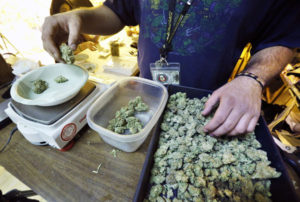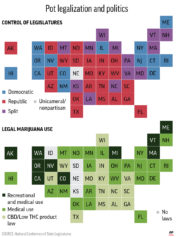
Sale will become legal in Washington state later this spring.
Here is some basic information about this drug and the controversial issues:
The active ingredient in marijuana, also known as cannabis, is delta-9-tetrahydrocannabinol or THC for short. THC, found in the leaves, stem, seeds and flower of the plant, is the chemical that binds itself to the nerve cells of the smoker’s brain and can temporarily alter visual, auditory, and olfactory senses. It can also produce a mild to moderate pain-killer effect, prevent nausea or vomiting, and stimulate appetite.
Marijuana can be smoked, ingested as food or in liquid form.
As people line up in Colorado to buy marijuana for recreational or medicinal use, families in North Carolina are now advocating for the use of the drug to be legalized there.
Local mom and supporter, Ellen Wingate has a four year old son, Logan, who suffers from a brain malfunction that leaves him with life-threatening seizures. The child has a hefty list of medications to treat his severe epilepsy. In an interview with Charlotte’s WSOC 9 news, Wingate said: “I have heard that it is beyond life-changing. Seizures stop, some kids are able to come off all their other meds, which is huge.”
Medicinal marijuana given to children would be in liquid form, which is lower in THC and psychoactive effects.
Marijuana is decriminalized or legal for medical use in about twenty states; but in North Carolina there has been an uphill battle to at least have medical marijuana reviewed by the state legislators.
U.S Representative, Walter Jones, a North Carolina Republican, in statement to the media, said: “Over the past months, I have been approached by several North Carolinian parents of children with terminal brain cancer, extreme epileptic seizures, and other life-threatening illnesses, who have exhausted all available medical options to provide relief for their suffering kids. These individuals have made a compelling argument that a non-intoxicating compound called cannabidiol, or CBD, could – if consumed in a safe, controlled liquid form – offer a viable medical alternative that would allow these children to enjoy a long, healthy life. Considering the extreme circumstances these families are facing, I believe this issue should certainly be studied at the state level. I encourage our state elected officials to give this issue the attention it deserves by consulting with medical professionals to determine the efficacy of the safe use of CBD in liquid form for young patients that have no other medical options.”
The legislation to reform North Carolina’s marijuana laws will carry over from 2013 to 2014 when the legislature reconvenes.
S.C. Rhyne is a blogger and novelist in New York City. Follow the author on twitter @ReporterandGirl or on Facebook.com/TheReporterandTheGirl and visit her website at www.SCRhyne.com


